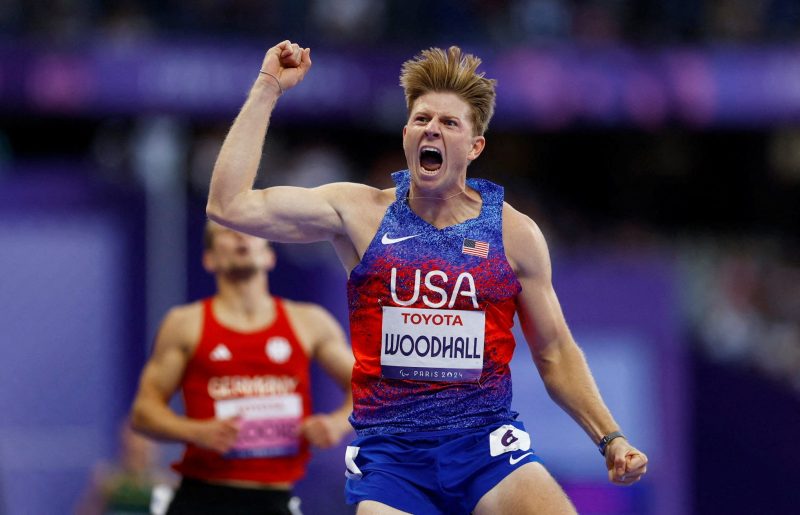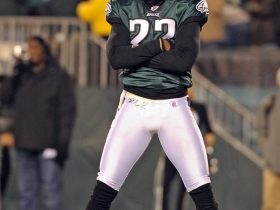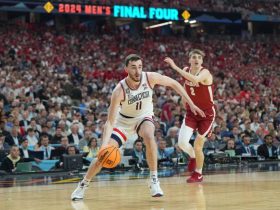SAINT-DENIS, France — Hunter Woodhall leaned forward, eyes fixed on the finish line at Stade de France.
It wasn’t just another race. This was the culmination of years of relentless training, a moment of destiny. As he surged ahead Friday in the final strides of the men’s T62 400-meter sprint, crossing the line at 46.36 seconds, Woodhall felt the weight of his journey lift, replaced by the overwhelming thrill of winning a Paralympic gold medal.
“This is my first gold, it’s my first time winning any major championship, and they couldn’t pick a better one,” Woodhall said after the race.
Not only did he contend with the best Paralympic sprinters in the world, he dominated. Woodhall finished the race strong, expanding the distance between him and the other runners in the final leg of the sprint.
2024 Paris Olympics: Follow USA TODAY’s coverage of the biggest names and stories of the Games.
“We went over this race, time and time again,” the 25-year-old double amputee explained. “I wrote down in my journal exactly how I wanted to run this race. It’s exactly how it went out.
‘The strategy was to push out of the blocks and run as easy as possible, because I knew it was going to come down to the last 100 meters.”
The Making of a Champion
Woodhall’s journey to the top came with plenty of challenges.
He was born with fibular hemimelia, a congenital condition where the fibula bone is either short or missing. When Woodhall was 11 months old, both of his legs were amputated to improve his quality of life long term.
He went on to become a successful high school and college athlete, breaking records and making history along the way.
His breakout moment on the international stage came at the 2016 Rio Paralympic Games, where he won bronze in the 400 meters and silver in the 200 meters.
By the time the Tokyo 2020 Paralympics came around, he added another bronze in the 400 to his growing collection, but still something was missing — a gold medal.
Paris provided the stage to complete the set, with Woodhall pushing his limits and finally clinching the top spot on the podium. He also won a bronze medal as part of Team USA’s 4×100 universal relay.
‘I brought my journal in these past few days,’ Woodhall said. ‘I’ve been writing in there, ‘I will be the Paralympic champion.’”
“And now it’s true.”
The Power of Two
Journaling was an idea Woodhall borrowed from his wife, Tara Davis-Woodhall — Olympic gold medalist.
A fellow track star, Tara recently captured gold at the 2024 Paris Olympics with a 7.10-meter leap in the long jump. Together, they form one of the most exciting power couples in sports.
“Tara has taught me a lot, and one of them has been like the power of self-affirmation and journaling,’ Woodhall said. ‘Before the Olympics, she was writing in her journal like, ‘I will be the Olympic champ, and I am strong and fast.’ And I brought that with me.’
The two met at a track meet and formed an immediate connection, one that grew as their athletic careers progressed. Though they attended different universities — Woodhall at Arkansas and Davis-Woodhall at Texas — they remained steadfast in their support for each other, navigating the pressures of elite competition. The couple married in 2022 and today they train side by side, each pushing the other to new heights.
Training with an Olympic gold medalist brings its own set of pressures, but it’s a pressure Woodhall thrives on, saying he likes when the jumper runs next to him on the blocks in training.
“Tara is incredible,” Woodhall said. “She’s my accountability partner, my training partner and my best friend. We do all this together, and these past four years there’s been a lot of trials and tribulations but we just worked through them as a team.”
Their relationship, while personal, is a crucial part of their professional success. The mutual understanding of the demands of competing at the highest level has allowed them to create a support system few athletes enjoy.
Davis-Woodhall said she rarely looked at or acknowledged her own gold medal until her husband had a chance to secure his own. Now, the two can wear them together for the rest of their lives as they will forever be champions.
“I mean, I’m pretty sure we both wrote down our goals of the year of Paralympic gold and Olympic gold, and we have not stopped working since then,” Davis-Woodhall said. “It’s been honestly the craziest journey of our entire life. And now we get to look at it every single day.”
Beyond the Track
Outside the oval track, Woodhall and Davis-Woodhall have become voices of inspiration. Their transparency about their journey, both the victories and the setbacks, has resonated with a large audience. On social media, they share glimpses of their training, competition, and personal lives, making the world of athleticism and gold medals feel more relatable.
Their message of perseverance and hard work has inspired thousands of young athletes. But it’s not just about motivation — the couple is also deeply committed to advocating for greater inclusivity and representation in sports. As prominent figures in their respective fields, they’ve used their platforms to challenge outdated perceptions of disability and promote diversity in athletics.
“I think there’s always a pressure to perform,” Woodhall said of running for his fans. “That’s just what athletics is about. It’s heart-wrenching. It’s tough. You never know what’s going to happen. But for me, I wanted to just give everyone supporting me a show. I knew how many people tuned into the Paralympics… I really just wanted to show them what the Paralympics is all about, what we’re capable of. And the reception was incredible.”
Together, the Woodhalls are pushing the boundaries of what it means to be an top athlete. As they look ahead to future Paralympic and Olympic Games, their journey continues to inspire a new generation of athletes — both disabled and able-bodied.
The question is no longer whether the Woodhalls can win together, but how long they can stay on top of the podium.







